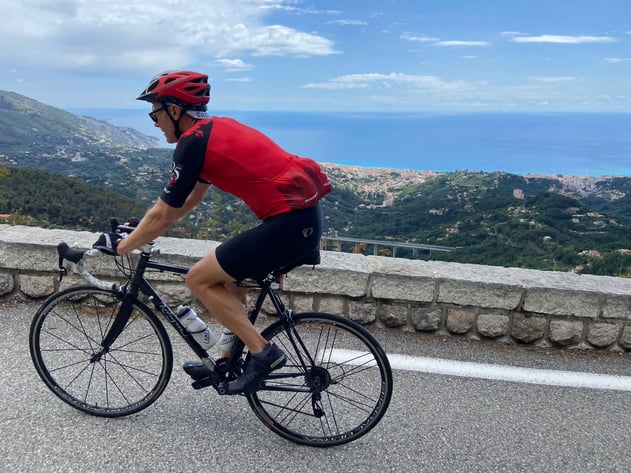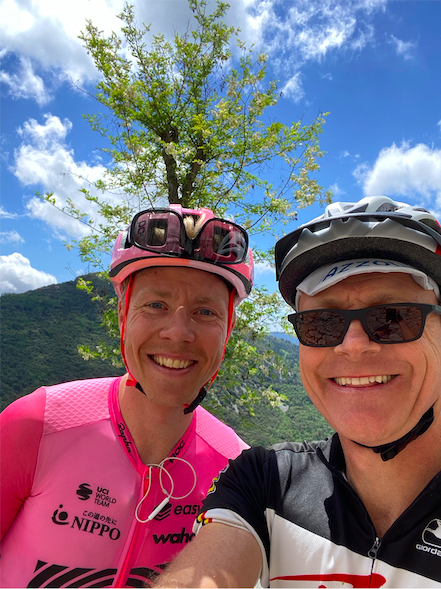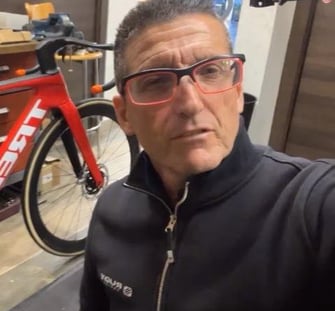Here's how a cycle crash led to an important lesson in business and life


Last week, I was cycling with a friend above the French Riviera.
We had recently crested the 13km climb of the Col de la Madone.
While coasting down towards the valley, another cyclist passed me. A handful of seconds later, he braked hard, almost coming to a stop. Surprised, I swerved left to avoid a crash. But he then did a U-turn and we smashed into each other, hard.

Climbing the Col de La Madone
As I lay on the road with a searing pain in my hip, I figured someone new to cycling had caused this crash. But I couldn’t have been more wrong.
I had run into Michael Valgren. The 31-year-old has ridden the Tour de France seven times. He won one of the world’s most prestigious races in 2018, the Amstel Gold race. In 2021, he finished third at the World Championships professional road race.
Michael wasn’t hurt by our fall, just a few bumps and scrapes. But my hip was killing me. I also felt like Mike Tyson had punched me in the ear. He apologised profusely, showing genuine concern. He suggested I take my time and he helped me off the road.
He then offered his name, telephone number, and asked me to call him if I had any issues.

Michael Valgren and Andrew Hallam
I didn’t take his number and insisted I was fine.
But that evening, after limping back to my AirBnB, I noticed one of my pedals was damaged. I paid $320 for the pair just one month before. Professional cyclists often have great contacts, so my wife convinced me to reach out to Michael on Instagram to see if he knew anyone who could help me get a discount on a new set of pedals.
I didn’t, however, expect him to respond. As a world-class cyclist, he has reams of Instagram fans. I didn’t think he would see my message. And if he did, it would have been easy to ignore. Michael is a busy guy. He has a wife and a newborn. The following day, he planned to leave town for a race.
But he responded right away and apologised again.
He then offered to meet me at a bike shop of my choice the following morning so he could buy me some pedals. I was impressed. But I didn’t want him to pay for them. His continued concern for my well-being and his kind offer was more than I expected.
I showed up at the bike shop, R Bike Menton, 45 minutes before our scheduled meeting time. Luciano, the owner, told me the night before that my pedal couldn’t be fixed.

I explained to Luciano, once again, what happened the previous day. “I don’t want Michael to buy me pedals,” I said. “Could you try to fix this one?”
Luciano went to work. For half an hour he pulled it apart, put it together, pulled it apart and then put it together. But by the time Michael arrived, he gave me the verdict. “This can’t be fixed.”
Michael wanted to buy me pedals. I insisted we go Dutch. But he was persistent and explained this to Luciano.
What happened next was a bit confusing… for someone who doesn’t speak Italian.
In his mother tongue, Luciano spoke to Michael. The bike shop owner didn’t want either of us to pay for those pedals… he offered a new pair, for free. He then simply asked to take a couple of selfies with Michael.
Michael said he would bring his bike to that shop when it needed work.
This benefited me, Michael and Luciano. Here’s why.
Research suggests that when we commit to random acts of kindness, it improves our strength, our life satisfaction and our health.
Science journalist, Marta Zaraska, referenced several such studies in her book, Growing Young: How Friendship, Optimism and Kindness Can Help You Live to 100. At one point, she wanted to see if the research she read about could be replicated by her, personally. She contacted scientists at the Stress, Psychiatry and Immunology Lab at King’s College, In London. They mailed her plastic tubes to collect her saliva three times a day (morning, noon and night) for seven straight days.
Cortisol is part of a chain reaction that contributes to stress. Acts of kindness typically reduce human cortisol levels. In turn, this positively affects our mood and consequently, our health.
During four of the saliva collection days, Marta Zaraska was instructed to live as she normally would. This established a baseline for her cortisol. But on the other three days, the scientists asked her to commit to specific acts of kindness, much as Michael and Luciano did.
Marta says she felt better during her kindness days. And when scientists studied her saliva, they reported that her cortisol levels dropped 16 percent.
Researchers at the University of British Columbia conducted experiments on seniors who suffered from hypertension. They split them into two groups and gave them money every week for three weeks. They asked one group to spend the money on themselves. They asked the second group to spend the money on someone else. At the end of the experiment, those who gave the money away recorded lower blood pressure levels.
The day after Michael Valgren met me at the bike shop, he finished second in a professional bike race. Did his kindness make him stronger? Research says it might.
Psychology professor Kurt Gray led a team of researchers who tested people’s strengths. Subjects were then asked if they could immediately perform an act of kindness. Then they were tested again. Those who performed the act of kindness performed better on the strength test the second time. Those who didn’t perform the act of kindness didn’t improve their result.
Several other studies suggest the same thing: helping others improves our health, longevity and our strength.
Perhaps Michael’s kindness inspired Luciano, the owner of R Bikes Menton. He didn’t have to give away a set of racing pedals.
But that might have boosted his mood. As with Marta Zaraska, it might have reduced Luciano’s natural cortisol level. As with Kurt Gray’s research subjects, it might have improved Luciano’s strength. As with the subjects in the University of British Columbia study, kindness could have reduced his blood pressure too.
And there’s more. Much more.
Luciano, whether he intended to or not, earned tremendous respect from Michael Valgren and from me.
What shop will we go to? Who will we recommend?
That answer is clear.
This brings us to today, and a challenge for you, dear reader.
What act of kindness will you perform today?
I promise, it will be worth it.
Science backs that up.
Best of all, you won’t have to crash into a new friend first.
Andrew Hallam is the best-selling author of Millionaire Expat (3rd edition), Balance, and Millionaire Teacher.

